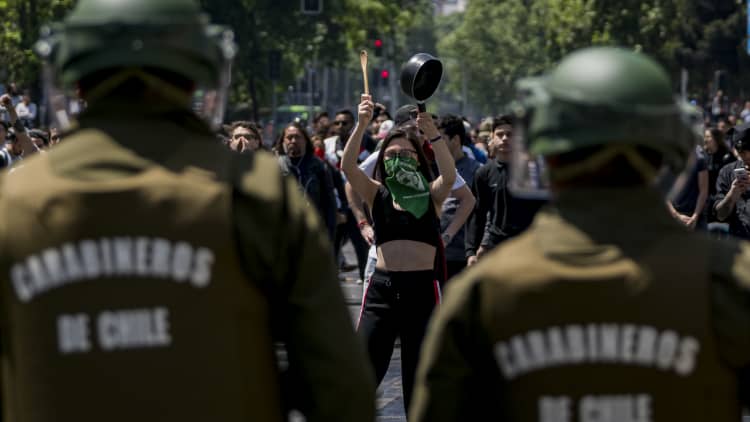
Chile's government extended a state of emergency to several cities across the country, after a weekend of violent clashes, looting and arson attacks.
Five people were reported to have died on Sunday, after looters set a factory ablaze in a northern suburb of Santiago, the country's capital city. It brings the death toll from violent protests to at least seven, Chile's interior minister said Sunday.
A proposed hike in public transport fares, which has now been suspended, sparked nationwide protests last week. The demonstrations have since widened to reflect public anger at rising living costs and income inequality in one of Latin America's wealthiest countries.
The military and police used tear gas and a water cannon against protesters over the weekend, with a night-time curfew also placed on residents in major cities.
"We are at war against a powerful enemy, who is willing to use violence without limits," President Sebastian Pinera said during a televised statement on Sunday, according to Reuters.
Pinera also said that the state of emergency he declared in Santiago on Saturday would be extended to cities in the north and south of the country.
It marks the first time since Chile returned to democracy in 1990 that the government has declared a state of emergency because of civil unrest in the capital.
"There's a feeling that democracy or the current government isn't delivering for ordinary people," Mark Keller, a Latin America analyst at the Economist Intelligence Unit (EIU), told CNBC via email on Monday.
Chile is famously known as Latin America's most stable and business-friendly economy, Keller said, but there is a sense that economic growth has failed to improve the lives of the majority of its citizens.
"These latest protests are the latest manifestations of that ongoing discontent. The fact that the protests spread beyond Santiago quickly show there's deep underlying discontent nationwide."
What's the background?
The interior minister, Andres Chadwick, said Sunday that 62 police officers and 11 civilians had suffered injuries in the latest bout of violence, with almost 1,500 people arrested.
Chadwick cited 70 "serious incidents of violence" on Sunday and said military and police numbers were at 10,500 in Santiago.
In several cities across the country, protesters set buses on fire, targeted metro stations and clashed with riot police.
The unrest means that, in addition to Santiago, a state of emergency will now be imposed on the cities of Antofagasta, Chillan, Punta Arenas, Talca, Temuco, Valdivia and Valparaiso. The measure will allow authorities to restrict people's freedom of movement.
Among OECD nations, Chile ranks as one of the worst for economic inequality. The government brought in tax reforms in 2014 to help reduce income inequality, but the long-term impact of these reforms remains to be seen.
Meanwhile, after growing at a rate of 4% in 2018, Chile has seen its gross domestic product (GDP) fall to 1.8% in the first half of 2019. That's largely because of a challenging external context, adverse climatic conditions and a delay in some government reforms, according to the World Bank.
The EIU's Keller said it was important to understand that these protests in Chile were symptomatic of "a regional issue."
"Growth has slowed regionally since 2013, and with the end of the strong growth rates of the commodity supercycle, we're seeing growing frustration among voters — many of whom recently entered the middle class — with the stalling of continued progress since then."
"As the region adjusts we've seen political earthquakes — in Mexico and Brazil, and probably Argentina next — and lots of small-scale civil unrest, most recently in Ecuador, and now in Chile. And it's a trend we should definitely expect to continue," Keller said.


